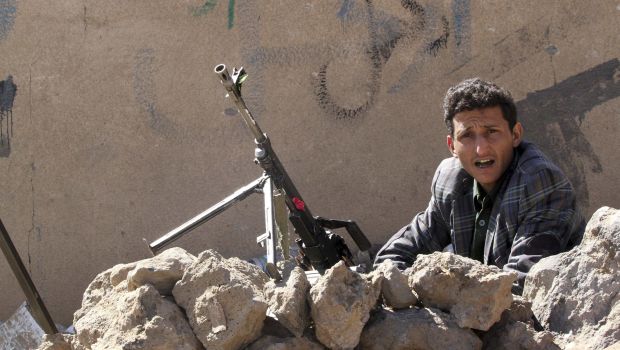
A member of the Shi'ite Houthi movement is seen next to a machine gun while securing the entrance to a ceremony commemorating the birth of Prophet Muhammad in Sana'a on January 3, 2015. (Reuters/Mohamed Al-Sayaghi)
Sana’a, Asharq Al-Awsat—A Yemeni presidential committee began a visit to Ma’rib province on Tuesday to resolve the escalating tensions following Houthi threats to attack the country’s oil and gas hub, according to the province’s top official.
Speaking exclusively to Asharq Al-Awsat, the province’s governor Sheikh Sultan Al-Arada said: “[The committee] is visiting within the framework of the Peace and Partnership Agreement, and under directions from the president of the Republic, for the implementation of the agreement and the outcomes of the comprehensive National Dialogue.”
Chaired by Minister of Defense Mahmoud Al-Subaihi, the committee consists of the ministers of interior and local administration and a representative from the office of President Abd Rabbuh Mansur Hadi.
“The committee has come to check on the situation, put the first touches [to the implementation of the agreement], and assure the people, the armed forces and the world that things in the province are normal,” the governor said.
Tensions heightened in the eastern province as local tribes pledged to hold out against a potential attack from the Houthis, the Shi’ite group which is in control of large swaths of Yemen, including the capital Sana’a, northern Saada on the border with Saudi Arabia, and other strategic areas to the west and center of Yemen.
The presidential committee, tribal sources maintained, has begun a series of meetings with Ma’rib’s key political and tribal forces to address the recent statement from the Houthi-aligned Ansar Allah group in which it accused tribes in the province of harboring hundreds of Al-Qaeda fighters.
The surge of the Shi’ite group in Yemen has triggered a backlash from Al-Qaeda in the Arabian Peninsula (AQAP)—composed of Sunni ultra-radicals hostile to Shi’ites and other sects—who have stepped up attacks on Houthi targets.
In a recent letter addressed to President Hadi, Prime Minister Khaled Bahah and the Yemeni parliament, Ansar Allah threatened to storm Ma’rib to purge it of AQAP militants. Ma’rib tribes responded by mobilizing large numbers of fighters on the outskirts of the province and near key power and oil installations, as well as other vital facilities.
Several Ma’rib political parties have announced their backing for local tribes against the Houthis, dismissing the movement’s claims that it is targeting AQAP as a pretext for securing a foothold in the province, which is home to the bulk of Yemen’s oil production and therefore a cornerstone of the national economy.
In a statement issued on Tuesday, the Joint Meeting Parties (JMP), a coalition of six opposition parties, said it condemned the Houthis’ accusation that Ma’rib tribes were harboring AQAP fighters, calling on the Shi’ite movement’s leader, Abdul Malik Al-Houthi, to issue an apology.
The statement said: “The political parties in Ma’rib province announce their support of the province’s tribes . . . and will not allow, in any case, the entry of any militias that tamper with the security and stability [of the province].”
Meanwhile, Prime Minister Bahah on Tuesday issued a resolution appointing several figures, with links to the Houthis and former president Ali Abdullah Saleh to the newly formed Special Security Forces.
The controversial resolution comes after Houthi pressures to integrate its fighters into Yemen’s security apparatus. Followers of former president Saleh within the Yemeni military have also been accused of colluding with the Houthi leadership behind the scenes to facilitate their takeover of Sana’a and other parts of Yemen.
The resolution named Gen. Yehya Qarqar, known for his links to Saleh, as the Special Security Forces chief-of-staff, and Col. Nasser Mohsen Al-Shawzabi, sympathetic to the Houthis, as the head of police operations.
